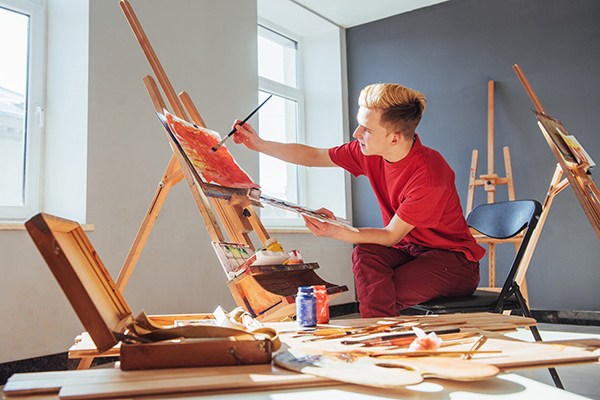Sports Psychology & Creativity in Thousand Oaks, CA
The field of optimal performance draws its knowledge base heavily from the field of sports psychology. If you think about it, there is much in common. Athletes are not alone in desiring to perform at their peak level. Many business people, musicians, and entertainers desire to be at the “top of their game” in their respective fields and would thus seek out the services of a psychologist.
Sports psychologists assist both professional and amateur athletes as they attempt to improve their performance, overcome restrictive issues, and reach their athletic goals. This field combines the disciplines of psychology (the study of the mind) with kinesiology (the study of human movement). To discuss sports psychology in Thousand Oaks, CA, call Laura Thomas, Ph.D.
Athletes consult with me for a variety of reasons. However, it is often competitive difficulties that are their main motivation. Athletes may struggle to communicate with teammates, control their temper, or maintain the motivation required to train. They may also find it difficult to maintain their focus during competition, control their anxiety, or keep from buckling under pressure. As a sports psychologist, I am here to help.
Parents of athletes must face some challenges of their own. While watching a child perform is exciting and rewarding, many parents are left frustrated and disappointed when things don’t go well. These reactions have an especially significant impact on younger athletes and ultimately play a major role in their enjoyment of sports. One need only refer to the many disturbing incidents at youth sporting events to see the challenges of raising an athlete. While a father may have the best intentions for his daughter during his sideline argument with the soccer referee, he also fails to realize the impact such actions can have on the children participating. To combat these incidents, sports psychologists such as myself help parents learn to deal with the pressures they face. In addition, psychologists foster the confidence, enjoyment, skill development, and cooperation that sports teach children. Furthermore, by consulting with me, parents also learn to help young athletes cope with the disappointment of a loss to ensure negative events do not permanently impact their child’s enjoyment of sports.
However, the benefits of sports psychology are not limited to the playing field. I equip athletes of all ages with techniques and strategies that extend to other settings, such as the workplace and school. With today's heavy emphasis on the external aspect of sports, psychological considerations often suffer. However, maintaining internal composure is one of the greatest determinants in performance quality, both on the field and off. I help athletes develop the inner calm needed to reach their optimal performance and overcome the challenges of competitive athletics.
The Mindful Athlete
Have you ever been the athlete who can't sleep the night before a big event? Or who gets so excited by out-of-control energy at the start of the race that you can't adhere to your anticipated strategies at the onset of the event? Have you ever been the athlete who says, "I have to...," or, "I can't...," or even, "I’d better...?” The constant barrage of such self-talk does not motivate the athlete to perform better, but instead detracts from the ability to do well. The practice of mindfulness, however, can augment your skills and optimize your performance when it counts.
The mindful athlete brings heightened awareness to their athleticism. Awareness has numerous appearances or manifestations, none of which are either right or wrong. Awareness is not a magical or a mystical process. It begins with merely noticing what’s there. Perhaps mindfulness is most notable on game day or race day when the first waves of excitement (or dread) become a bare whisper at the back of the athlete’s mind. The mindful athlete “notices” their inner state. Amid this subtle awareness, a breath is taken, and space is given to the subtle sensations that may be barely forming.
The mindful athlete, with the support of a sports psychologist, continues to grow their awareness. Their senses take in the sounds, the odors, the sights, and the kinesthetic experiences available to them. Without judgment, they observe the “self” in response to stimuli, both inner and outer. Again, the mindful athlete breathes while allowing space to surround these sensory experiences. And another breath ensues with a gentle softening of the thoughts and judgments that are responses to the sensory stimuli


All of this occurs in an instant. The observation, the unfolding awareness, the constant shifting, the breathing, and the admission of space followed by the softening: these all belong to the same moment. Nothing is forced. All is allowed. Even what the mind believes is unwanted, undesirable, even detrimental, is permitted. Because what is allowed to exist does not have to be anything more than what it is. If it is a whisper, it can remain a whisper. It needn't become a shout, because you have noticed the whisper. When the mind becomes aware of an unwelcome thought, that same mind “notices” the effects on the self, and compassionately softens where it can, letting go of the tensions of self-judgment, pressure, and comparison. The mind detaches from the thought itself while still holding it in awareness. Breathing, always breathing… It takes on its own rhythm: the breathing, the noticing, the giving of space, the allowing of what is. As a supplement to the lessons of sports psychology, mindfulness is a powerful tool for improving performance and well-being.
Micro-adjustments are always in the mind and body of the athlete, serving to support the physical training that has primed the athlete for game day or race day. Knowing that the mind's “best thoughts” may actually serve to undermine the performance of the athlete, the athlete observes the chatter of the mind, the tendency to apply pressure, to label, or to compare. The athlete brings awareness, breath, softening, and the gentle allowing of space to exist, which paradoxically allows space to change. Thoughts come into awareness (“this is hard”) and thoughts recede much like the constantly shifting terrain over which you may be riding or running. With mindfulness, we realize we can no more hold onto a thought than onto a breath if we tune into the natural rhythm of things. Detaching from thoughts while acknowledging their existence through mindful awareness allows the mental transformation to occur which supports optimal performance.
The mindful athlete aspires to be in the flow, in the zone, of the moment that is; not the moment that isn't. There is less resistance and more effortlessness which in turn supports the athlete to perform optimally.
Creative Block Assistance in Thousand Oaks
Artists often live their lives on the edge. And in so doing, they often hit various blocks and obstacles to their creativity. Panic sets in when this occurs, as the arts are their livelihood, not to mention their passion. Particularly when the mental blockage doesn't quickly subside, it can raise many questions and fears.
For effective creative block assistance in Thousand Oaks, CA, schedule a session with Laura Thomas, Ph.D. I am a licensed therapist and psychologist who can help you overcome your challenges so that you can accomplish your creative goals.
What Can the Artist Do About Creative Blocks?
Part of the wear and tear on the psyche of the artist is the fact that they are so very exposed. Artists are often highly sensitive individuals. That is why they are who they are, and why they do what they do: to express these sensitive thoughts and feelings. Their intimate selves are externalized and exhibited through their art. This is a highly vulnerable process, and it can drain and demoralize the artist’s psyche to be so endlessly scrutinized by the public.
However, as a psychologist for artists, I will support you and help you use this creative block as an opportunity to move forward. We’ll use our sessions together to learn how to:
- See this as an opportunity to welcome rather than a time to fear
- Check to see that the outer life is in balance
- Recognize this as part of life's inevitable cycles
- Learn to “ride this wave”: Trust that this obstacle, too, like all the others before it, will recede in time
When we have truly learned to welcome all of life’s experiences equally, whether they are those we call “good” or those we deem “bad,” then and only then have we truly learned something of value.
Experienced Psychologist for Creative Professionals
Artists are often highly intelligent and attuned to their feelings, which make them who they are; their thought processes and worldviews are unique. If they are fortunate enough to make a living with their art, they often worry about keeping up the pace, coming up with new ideas, and being able to sustain themselves. Intense, self-imposed standards can lead to fears about failing to "perform" at optimal levels.
Creative blocks occur for many reasons. Artists tend to put their entire psyche into their work and usually expose their innermost being to the public. Often, the perceptions of the viewing public are diametrically opposed to the artists’ intentions. This may lead to feelings of being misunderstood, anxiety, and depression.
What’s more, by repeatedly exposing themselves to the public, artists become susceptible to vulnerability and severe self-doubt. These fears may manifest as the artist's creative block. The artists may feel that he or she has nothing new or worthwhile to say or nothing that he or she is willing to display to the public. By speaking with a psychologist for creative individuals, though, this downtime from artistic productivity can be redirected into valuable time for reflection, which can, in turn, lead the artist to rediscover the inspiration and passion that drives the work.


Reconnecting With Your Artistic Motivation
My goal as a psychologist for artists is to help you embrace this situation and not look at it as a crisis. If you are going through a creative block, you can use this time for self-reflection and soul searching. With my guidance, you can come to recognize the block as a healthy part of the creative cycle, a period of respite in which your imagination recuperates, and in which you perhaps even discover a new creative direction.
Even those who are not artists go through similar periods of adjustment, which lead to questions and thoughts such as:
- Why am I doing the kind of work I do?
- Is the work still enjoyable for me?
- Do I have a passion for what I do, or am I just going through the motions?
With my professional help, you can begin to process these questions clearly.
You have the ability to go inward and find your truth. By accepting that your creative block is temporary and that with assistance, your block may also be transformed into an asset, you acquire new freedom to grow as an artist and a person.
Contact Laura Thomas, Ph.D. to schedule your appointment. I provide a personalized approach to therapy for clients in Thousand Oaks, California.

Achieve optimal performance by consulting with a sports psychologist.
Call (805) 371-1825



